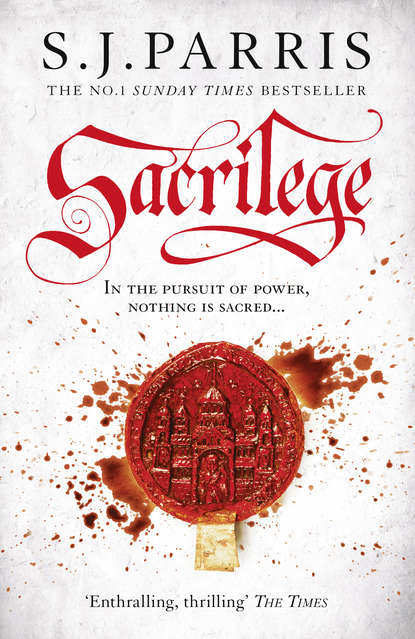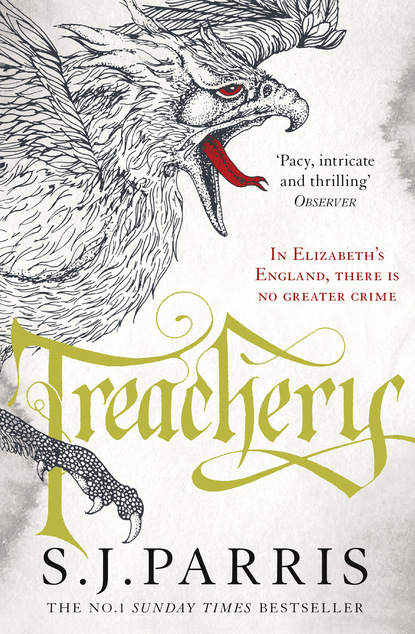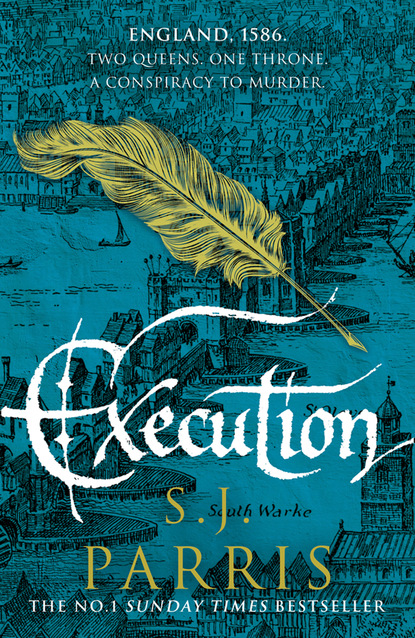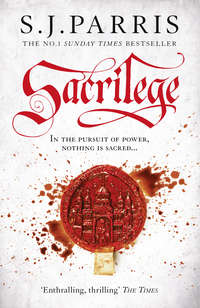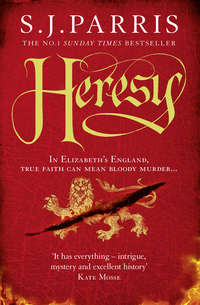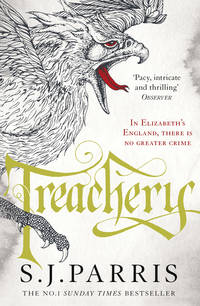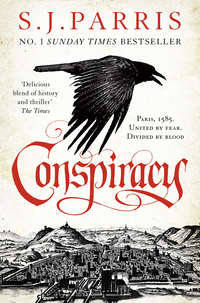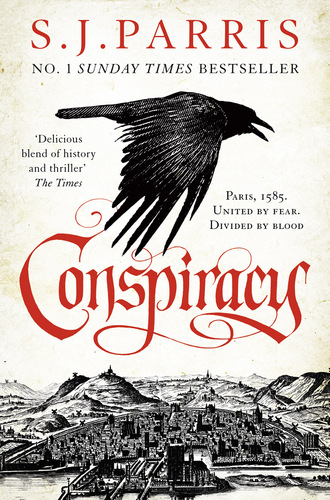
Полная версия
Conspiracy
‘Is anyone there? Hey!’
From somewhere behind me came an answering moan that sounded as if it had been loosed by one of Dante’s lost souls. I let out a cry, startled to find I was not alone. Dear God, what was this – a dungeon? The darkness was so thick you could almost feel it sliding across your face. I staggered forward, step by halting step, until finally I collided with a wall, slimy to the touch. Facing away, I groped along the stones with my bound hands as far as I could, until I met a corner. I followed that wall too, battling my rising fear that there was no door here, no way out. I stood still and shouted again for help, stamping my feet on the stone floor, though this produced no effect at all. The formless lament from the depths of the room grew louder and more agitated the more I yelled for someone to come, until the pitch of it made the wound on my head throb as if it would burst open—
‘For the love of Christ, will you stop that? I’m trying to make myself heard here.’
The tortured noise broke off abruptly. I peered into the darkness but could make out nothing. In the silence I heard a shuffling in the straw and a soft trickle of water, which could have been the damp running down the walls or my companion relieving himself. I put the thought from my mind and resumed my shouting.
‘They won’t come.’ The voice from the corner scraped like a rusted hinge, as if it had not been used in years.
‘Where are we?’ I cast around in the dark, desperate. ‘Who are you?’
There was a rasping sound, a cough or possibly laughter, followed by the wet spatter of a gob of phlegm ejected on to the wall or floor. ‘I don’t remember.’ A pause. ‘That’s why we’re here. They forget you, then you forget yourself.’ More hacking, as if he were amused by his own joke.
Forget yourself. Dio mio … ‘An oubliette? Is that where we are?’ The deepest pit of any prison, underground, where they throw those who will never see the sky again. Those best forgotten, as my unseen companion pointed out. Panic surged through my veins; I resumed my stamping and shouting with renewed urgency, fighting the insistent voice in my head telling me it was likely that no one who could help me knew I was here. My fellow prisoner took up his wordless keening again, softly this time, as if exhausted by his own grief. After another prolonged bout of yelling until my throat was raw with the effort, I began to understand why his voice sounded so broken. Presumably he, too, had screamed himself hoarse at first in the belief that someone would respond. I stopped to gather my breath, and was rewarded by the sound of a metal bolt rattling overhead.
A hatch swung open above me and a greasy yellow light swept around the walls, revealing a low-ceilinged, windowless pit. I squinted, turning my face away; though it was only one candle in a lantern, the glow was still shockingly bright after the long spell in darkness. Once my eyes had adjusted, I was able to peer upwards to see the lower half of a face, veiled in shadow, looming through the opening.
‘You listen. I’m only here to tell you that if you keep up that fucking noise, I will come back and shut your mouth for you.’ I could make out stumps of teeth and a prominent growth on the man’s stubbled cheek. ‘Understood?’
‘Wait,’ I managed to stammer, ‘there’s been a mistake. I shouldn’t be here.’
The gaoler cackled. ‘That’s right, friend. You and all the others. Never met one yet that thought he should.’ He withdrew, and the light with him.
‘Please! I need to send a message to my friend. I will pay you handsomely if you help me.’ I lurched a step closer to the opening. The man leaned down, cocking his head as if he were considering the offer. His expression suggested he doubted my ability to deliver on this promise.
‘Tricky. See, someone’s already paid me to keep you in here.’
‘I will pay you more.’
‘Wouldn’t be so much use to me without a head, though.’
‘That won’t happen. Please – just send a message to the Louvre, that’s all I ask.’
‘Oh, is that all?’ In the light from the lantern his face contorted into a grotesque grin. ‘Friend of the King, are you?’
‘In fact, yes. Only let me prove it.’
He let out another bark of laughter. ‘You’ll be right at home here, then. Among the nobility. You all right, Monsieur le Comte?’ He lowered the light through the hole and I turned to see the creature in the corner raise his head with a frightened whimper. I could not suppress a gasp; my fellow prisoner was hardly recognisable as a man. He was so emaciated that he seemed little more than a corpse. Blistered yellow skin stretched tight over his skull; wisps of long grey hair cobwebbed over a face that would have been hideous, had it not been so pitiful. The man tilted his nose up like a mole, sniffing the air, and I could see that his eye sockets were empty, the rims livid with scar tissue. He was almost naked, save for a few scraps of rag, the remnants of clothes that had rotted away. Unlike me, he was not restrained with ropes or manacles; perhaps he was so destroyed there was no need.
‘Not pretty, is he?’ the gaoler remarked, with a cough. ‘Best you’re in the dark, so you don’t have to see him. Stay here long enough, you’ll look like that too.’ He backed away from the hatch, still laughing.
‘No – please!’ I cried, feverish with desperation. ‘Send a message to the palace for me – I beg you.’
‘Tell you what – I’ll put a word in next time I’m taking dinner with the King. In the meantime, you keep quiet and I might throw you something to eat later if you behave.’
‘No, wait—’
But the flickering circle of light vanished and the wooden cover dropped back into place with terrible finality; his laughter was still audible as the bolt was shot into place. I called a few more times, but it was evident that he was not coming back. It was only now that I realised how painfully hungry and thirsty I felt; I was torn between the need to try and negotiate with him, and the fear of jeopardising my prospects of food. And possibly those of my companion, I thought, and I could not risk that; he looked as if one more day without eating might be the end of him – although perhaps that would be a kindness. I crawled across the straw in the direction of the poor wretch in the corner, making reassuring noises to disguise my own fear. I could hear him moving away from me as I approached.
‘Don’t be afraid,’ I whispered. ‘Listen. Your hands are free. Can you untie me?’
His only response was a choked sob. Curbing my impatience, I tried again.
‘I won’t hurt you. Will you help me? Please. I can’t think clearly with this pain in my arms.’ I shuffled closer on my knees until I heard his ragged breathing beside me. The stink coming off him made me retch; not just of his own filth, but the rotting odour of infected flesh from the sores and lacerations I had seen all over his body. It was a wonder the man was still alive. I turned my back and lifted my bound hands until my fingers made contact with him. I waited, breathing through my mouth – though that made little difference. After a long moment, a bony hand clasped my wrist. I gritted my teeth; those who fear the dead walk out of their graves to visit the living on All Hallows’ Eve must imagine just such a touch as this. But with surprising gentleness, those claw-like fingers began to pick at the knot on the cord holding me.
‘Are you really a count?’ I asked, as he worked. For a while he didn’t answer. I could tell the task was costing him considerable effort; it must have been painful to bend his fingers.
‘I had that name once,’ he croaked, when I no longer expected a response. ‘Now I am no one.’
‘Why are you here?’ I was determined to keep up a conversation, though he seemed to find speech difficult. But only this meagre human contact could keep me from despair, I knew, though it was probably too late for him.
Another long silence elapsed; I could not tell if he was ignoring me or merely concentrating.
‘Saint Bartholemew’s,’ he whispered, at last, and his voice cracked as he spoke. At the same time, I felt the rope slacken slightly around my wrists. I tried to pull them apart; he laid his hand on my arm. ‘Patience,’ he murmured, and resumed his plucking at the knot.
‘Saint Bartholomew’s night? You are here because of the massacre?’ I flinched, despite myself.
He remained silent as he eased the rope away from my hands and rubbed at the raw patches on my wrists where the bindings had broken the skin. Gingerly, I raised one arm and touched the back of my head; there was a tender lump where I had been struck, and my hair was crusted with dried blood, but the wound was no longer bleeding. The massacre of Saint Bartholomew’s happened thirteen years ago. Had he been here all this time? My mind baulked at the thought.
‘They came for the wedding,’ he said eventually, in a distant voice. ‘From the south. All Huguenots, you see. They were guests in my house.’
‘Who?’
‘My cousin. His wife. The little girls. They had new gowns for it.’ His voice faltered and his breath hiccupped again. If he had had eyes, they would have been shedding tears. I reached out and through the dark I found his hand. Swallowing down my revulsion, I let him fold those dreadful skeletal fingers around mine and gradually his distress appeared to subside.
No one in France could fail to shiver at the mention of Saint Bartholomew’s night. The twenty-third of August, 1572, when Catholic mobs rampaged through the city, putting every Protestant they could find to the sword. The Seine ran crimson with blood for days after. Catherine de Medici had tried to force an end to the wars of religion by marrying her wild and beautiful daughter Margot to the leader of the Huguenots, the Protestant Henri of Navarre. The marriage was not approved by the Pope, and many devout Catholics were furious at the prospect of such an alliance, but Catherine pushed ahead with the wedding regardless, inviting the most prominent Huguenot nobles in the country to Paris for the celebrations, more extravagant and decadent than any of her famed entertainments. After three days of feasting, dancing and pageantry, the bells of Saint-Germain l’Auxerrois rang out at midnight – a prearranged signal for Catholic troops to kill all the Huguenot leaders in Navarre’s entourage, off guard, undefended, many of them in their bedchambers. No one, even now, could say for certain who planned the assassinations or gave the initial command, but the bloodlust spread quickly through the streets; anyone known or suspected to be Protestant was cut down where he stood, or dragged out of bed to be murdered along with his family. Women, children, babies, grandmothers; corpses piled up in the gutters and clogged the river.
I was still in Italy at that time, but my friend Philip Sidney had been living in Paris and told of barricading himself into the English embassy along with Sir Francis Walsingham and his young family as the mob tried to break down the doors. Neither ever forgot the horror of that night: the screaming, the smell of blood, the sight of heads, limbs, entrails scattered in the streets the next morning as if on a battlefield. The shovelling up of corpses, so many that there was not room in Paris to bury them all, the unclaimed dead left to rot along the banks of the Seine. The memory of it drove every decision Walsingham made with regard to the defence of England; he believed the same horrors would come to London if Catholic forces invaded. When King Henri talks of an uprising, it is another Saint Bartholomew’s that he fears – as does every citizen of Paris, Catholic or Protestant. It is a fear that the Catholic League has learned to exploit, as the pamphlet I had found in Joseph’s room made clear.
‘What happened to your cousin?’ I asked the Count.
‘It was her doing,’ he said, with unexpected vehemence, clutching at my hand. I felt his spittle fleck my cheek. ‘The soldiers came, demanding I give them up. I said I had not seen them. But they broke the doors down and ransacked my house. They found them all. Even their servants.’ He paused to draw a rattling breath. ‘I said I had not seen them,’ he repeated, in a hollow voice.
‘So you were punished,’ I murmured, understanding. ‘For not seeing.’
‘He took my eyes. And I thanked God, because then I was spared the sight of the little children lying in their gore. Would he had taken my life too. But he will not let me die. Nor will he let me live. He says he still has a use for me in here.’
‘Who do you mean? Who blinded you?’ I asked.
He heaved a great sigh. ‘You know who. Young Henri.’
‘The King?’ I drew back, staring.
‘No. You are confused, boy. Charles is the king.’ The old man gripped my hand tighter. ‘I mean Henri Le Balafré.’
The Scarface. The popular nickname of Henri, Duke of Guise, on account of his prominent war wound.
‘But you said it was her doing. Whose? Do you mean Catherine?’
It was asserted as fact by many that the Queen Mother had issued the order for the Protestant leaders to be killed, to isolate her new son-in-law and ensure he knew where his loyalties now lay. In her defence, people said, she had not anticipated how the flame of murder would catch and consume the entire city, and spread through France until perhaps seventy thousand Protestants lay slaughtered. But the uncomfortable fact remained that, before the bells rang out at midnight, someone’s agents had slipped silently through Paris, marking every Protestant home with a white cross, ready for the Angel of Death. There were plenty of others, of course, who pointed the finger at Guise.
‘No more now,’ the Count said, his voice drained.
I let go of his hand and felt him slump against the wall beside me. He had been in this pit for so long he had no idea King Charles was dead, and his brother now on the throne. But his memory seemed sharp enough when it came to the terrible events that had brought him to this place. If it was true that he was being kept here by the Duke of Guise, then we must be in a Guise prison, and I had no prospect of sending word to anyone with the influence to save me. Another wave of panic overwhelmed me; I had to stand and pace the limits of that confined space before the pounding in my chest and head would subside. Perhaps after some weeks the King would notice I had disappeared, but would he make the effort to find me? Would he dare to confront Guise for my liberty, if I were still alive by then? I forced myself to cling to the gaoler’s words about food; if I was to be fed, they surely did not mean to kill me immediately. Cotin had said that the Abbé wanted me questioned about Paul Lefèvre; it was no great leap to suppose that it was Guise who was interested in the answers, and that the Abbé had handed me over. Perhaps I was only here as a prelude to interrogation – a thought which did not bring comfort. When I had brought my breathing under control again, I crouched beside the Count.
‘You were at court when Charles was king?’ I asked.
‘Another kind of prison,’ he murmured. It appeared he had not lost all his wits, then.
‘Did you ever hear mention of Circe?’ It was a long shot, I knew; the man had been shut away from the world for thirteen years. Much had changed at court since then, but perhaps not that much.
‘Circe.’ His voice drifted off again, as if he were searching his memory. He let out a bitter laugh. ‘I know that name.’
A small flame of hope flickered. ‘What does it mean? Is it a person? A woman?’
He took a long time to answer.
‘She is a witch,’ he said, at last. ‘A temptress. You must know this. She robs a man of his will, until he is no better than a beast.’
‘I know the story from the Odyssey, yes,’ I said, trying to hide my disappointment. ‘The enchantress who turned Odysseus’s men into pigs. But is there another Circe? Someone in Paris?’
‘A temptress,’ he said, again, more forcefully this time, his voice weighted with contempt. ‘But they all are, behind the mask. They bewitch you, then betray you. You will learn, boy.’
He fell silent. I could not tell if he was speaking of Homer’s mythical enchantress, or someone specific, or women in general. If the latter, he need not have feared; I had already learned that lesson the hard way.
Perhaps I slept; it was difficult to tell down there in the unchanging dark. I tried to keep my mind occupied, anything to steer it away from the edge of despair. I had no idea how much time had passed before I was jolted back to awareness by the sound of the bolt and the sudden intrusion of light from the hatch.
‘Oi. You. The foreign whoreson.’ The gaoler leered into the opening; I could see only his mouth and chin. ‘Seems Dame Fortune is smiling on you tonight, my friend.’
‘I can’t remember when I felt luckier,’ I said. I guessed from his sarcasm that things were about to take a turn for the worse.
‘Shut your mouth and get on your feet against that wall while I fetch the ladder. Governor’s orders. Someone’s just paid your bail.’
Конец ознакомительного фрагмента.
Текст предоставлен ООО «ЛитРес».
Прочитайте эту книгу целиком, купив полную легальную версию на ЛитРес.
Безопасно оплатить книгу можно банковской картой Visa, MasterCard, Maestro, со счета мобильного телефона, с платежного терминала, в салоне МТС или Связной, через PayPal, WebMoney, Яндекс.Деньги, QIWI Кошелек, бонусными картами или другим удобным Вам способом.


